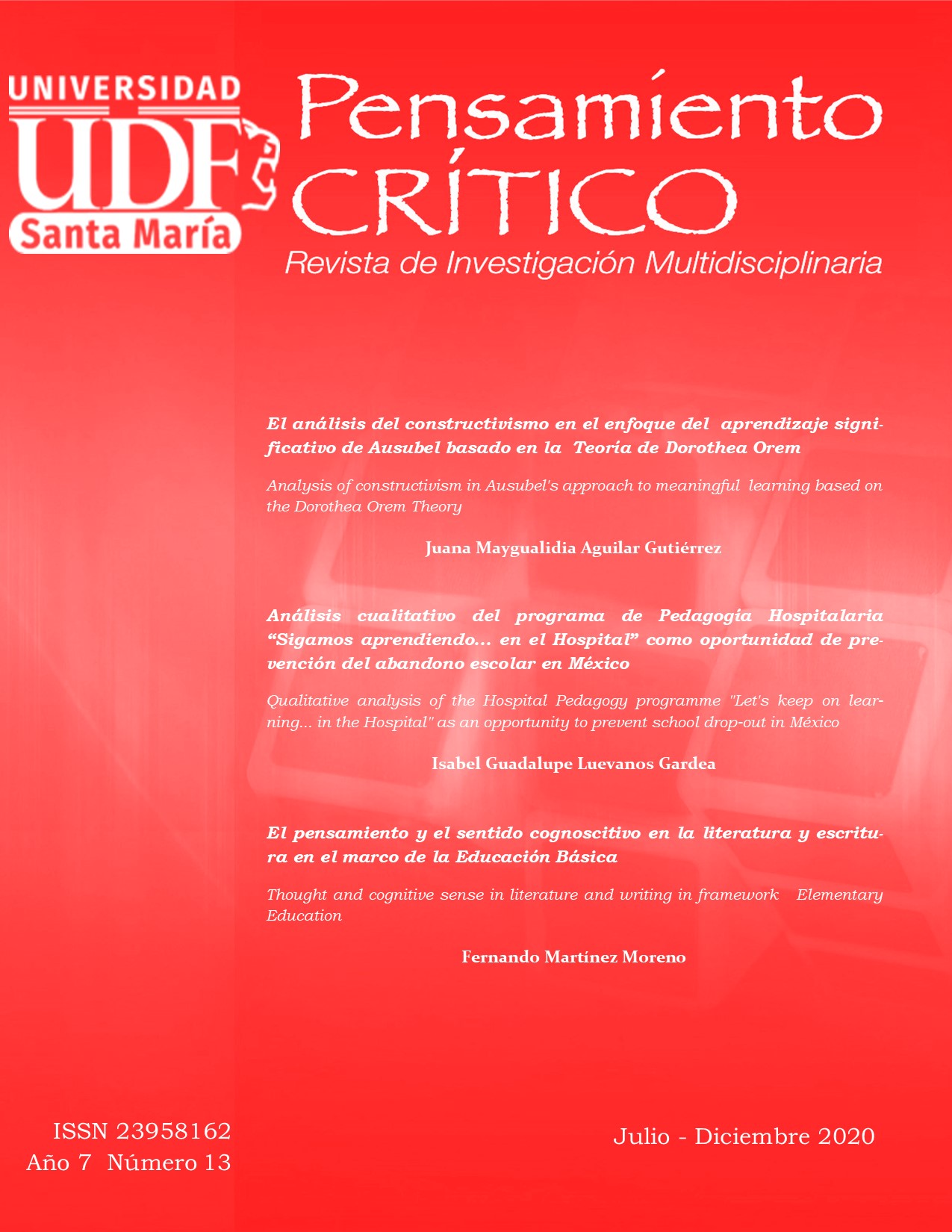Abstract
The general objective of this article is to analyze the adoption of conceptual elements of Dorothea Orem's theory. Under cognitive and affective aspects of meaningful learning, through a series of didactic tools that were implemented in each moment of the development of the workshop course. The methodology is qualitative and was approached under the perspective of hermeneutics. The results point out the linkage of 11 categories between the affective aspects of meaningful learning, 3 categories did not achieve an effective linkage with the cognitive aspects, evidencing the disparity between them. It is concluded that it is neces- sary to focus on currents that promote the construction and production of individual and collective knowledge in the teacher, considering that every class or educational session, to be effective, must be structured with a logical sequence of contents and must be adapted to the educational level of the students.
References
Arráez, M., Calles, J. & Moreno de Tovar, L. (2006). La Hermenéutica: una actividad interpretativa. Sapiens. Revista Universitaria de Investigación, 7(2), 171-181.
Ausubel, D. P. (1976). Psicología educativa. Un punto de vista cognoscitivo. México: Trillas.
Castro, S. & Rivas, N. (2008). Bailemos al son que nos toquen: una simulación instruccional para mediar sobre el aprendizaje de los estados de agregación de la materia. Investigación y Post- grado, 23(2), 271-293.
Díaz Barriga, F. & Hernández R. (1999). Estrategias docentes para un aprendizaje significativo. Mé- xico: McGraw Hill,.
Gordon, M. (2015). Diagnóstico enfermero proceso y aplicación. España: Mosby/Doyma
Guerri, M. (2021). La teoría del aprendizaje significativo. Disponible en: www.psicoactiva.com
Henderson, A. (2015). Leadership and communication: what are the imperatives? (editorial). Jour- nal of Nursing Management, 23, 693-694.
Hernández, I. & Recalde, J. & Luna, J. (2015). Estrategia didáctica: Una competencia docente en la formación para el mundo laboral. Revista Latinoamericana de Estudios Educativos, 11(1),73-94.
Lincovil, M. G. (2018). 20 frases célebres de Paulo Freyre que todo docente debería conocer. Extraído de: https://eligeeducar.cl/historias-docentes/20- frases-de-paulo-freire-que-todo-docente-debiera-conocer/
Matienzo, R. (2020). Evolución de la teoría del aprendizaje significativo y su aplicación en la educación superior. Dialektika: Revista de Investigación Filosófica y Teoría Social, 2, (3), 17-26.
Moreira, M. (2005). Aprendizaje significativo crítico. Indivisa. Boletín de Estudios e Investigación, 6, 83-102.
Navarro, Y. & Castro, M. (2010). Modelo de Dorothea Orem aplicado a un grupo comunitario a través del proceso de enfermería. Enfermería Global, 9(2) 1-14.
Olivella, M., Bastidas, C. & Castiblanco, M. (2010). Propuesta de una ruta metodológica para la implementación del modelo de Orem en la práctica de enfermería. Salud Uninorte, 26(2), 339-348.
Ortiz, D. (2015). El constructivismo como teoría y método de enseñanza. Sophia: Colección de Filosofía de la Educación, 19 (2). 94-110.
Parra F., & Keila, N. (2014). El docente y el uso de la mediación en los procesos de enseñanza y aprendizaje. Revista de Investigación, 38(83), 155-180
Raile, M. (2015). Modelos y teorías en enfermería. España: Elsevier
Serrano, J., & Pons, R. (2011). El Constructivismo hoy: enfoques constructivistas en educación. Revista Electrónica de Investigación Educativa, 13(1), 1-27.
Viera, T. (2003). El aprendizaje verbal significativo de Ausubel. Algunas consideraciones desde el enfoque histórico cultural. Universidades, 26, 37-43.

This work is licensed under a Creative Commons Attribution-NonCommercial-NoDerivatives 4.0 International License.
Copyright (c) 2025 Pensamiento Crítico. Revista de Investigación Multidisciplinaria

